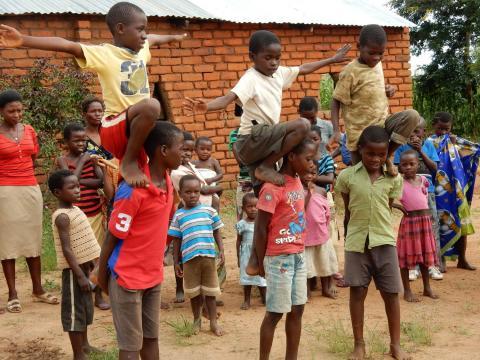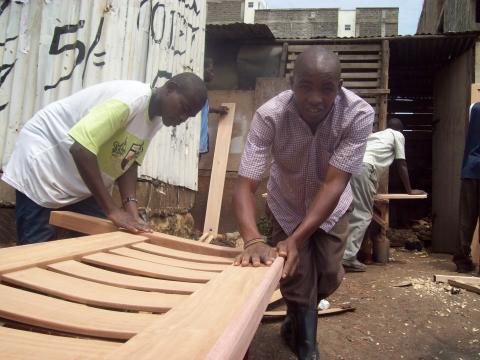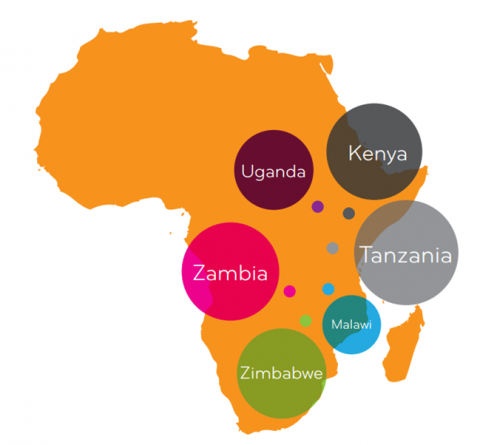When Futures For Kids was set up by a group of individuals from the futures industry in London in 2008, the objective of the foundation was to help the industry raise funds for charitable causes that help improve the lives of disadvantaged children and young adults across the world. Since its launch, it has helped support over 30 charities in more than 20 countries, with donations of over £2,250,000 raised from the industry.
Bill Templer, Chairman of the Board Trustees of FFK, is often asked what drove him to help found the industry’s charity: “There are many answers, but one of the clearest inspirations for me was the story behind the founding of WeSeeHope by Phil Wall and his wife Wendy and their incredible work in support of some of the poorest and most vulnerable children in Africa.”
Wall’s story began more than 18 years ago on a visit to a children’s home in Johannesburg, where he met a girl called Zodwa. Her mother was a sex worker suffering from HIV/AIDS and was struggling to care for her daughter. Phil, an experienced executive coach, and his wife Wendy went through a long process to adopt Zodwa, but at the last minute, her grandmother came forward to take her in.
When the adoption fell through, the Walls committed to raising funds to help other children in similar circumstances to Zodwa. Their vision kick-started the 1010 Challenge, a fundraising scheme that tasked individuals to turn £10 notes into £100 to help support vulnerable children in Africa. The initiative was hugely successful. It raised £2 million and led to the formation of the U.K.-based charity in 2000, originally named HOPEHIV and now known as WeSeeHope.
“WeSeeHope was one of the first charities that FFK pledged to support and we have continued that support ever since our foundation in 2008,” Templer says. “I was born in Kenya, so when Mark Glen, CEO of WeSeeHope, offered me the chance to visit some of the charity’s projects in Nairobi, I was thrilled to have the opportunity to return to the country I had left as a small child, along with a charity that was doing so much to support young people.”
It is hard to describe the slums of Kibera, just on the edge of Nairobi, where some half a million people live. There are no government clinics or hospitals, there is inadequate sewage and there is very little electricity. An overwhelming number of people are trying to scrape together enough money each day just to buy a meal. Add to this extreme poverty and isolation, and an HIV/AIDS epidemic that has left millions of children as orphans, and it is little wonder that drug abuse, prostitution, gangs and violence are rife.
One of the many projects that FFK has helped to fund through WeSeeHope recognizes that street children themselves should be part of the solution to the problems they encounter. The project works with the gangs that many young people are forced to join to create supportive and economically viable self-help Street Associations. WeSeeHope and its local Africa project partner provide vocational training for the young members of the Street Associations and offer access to basic education for vulnerable young people too. The project has already formed more than 300 Street Associations, positively changing the lives of around 7,000 young people in Kibera.
The charity has four core objectives to their support of isolated children:
1. To provide emotional and social support to children who experience grief, neglect and emotional distress and reintegrate them into a caring community.
2. To enable communities to safeguard children and uphold their rights.
3. To give impoverished children access to education.
4. To equip young people for a better future through vocational training and apprenticeships and the provision of start-up materials in areas such as tailoring, carpentry and mechanics.
Crucially, the charity makes sure its work is sustainable by economically empowering communities so they can support vulnerable children for the long term. Through grassroots savings and loan groups, its innovative Village Investors Programme (VIP) gives parents, guardians and committed community volunteers the opportunity to save their money, as well as borrow small amounts of money to build their businesses. This enables them to earn a sustainable living, which ultimately means they can look after the children in their care better, and for longer.
WeSeeHope:
- Works with 19 local African project partners
- Works in 185 communities across six countries in Africa
- Helps 52,000 direct beneficiaries every year
- Targeting to reach 150,000 children annually by 2020
- weseehope.org.uk
WeSeeHope aims to establish 500 VIP groups across Africa by 2018, economically empowering 15,000 VIP group members and benefiting 65,000 children. The charity’s data shows that every young person supported goes on to help around four others, so there is a ripple effect.
In addition to the support from FFK, a number of firms in the futures industry have chosen to support WeSeeHope directly. Eurex and Mako have been long-term partners in their own right, and others, such as Trading Technologies, have also contributed through fundraising efforts in their London offices.
While its core operations are based in the UK, WeSeeHope now has branches in Germany to and Sweden set up by committed, long-term supporters. The beginning of 2016 will also see the launch of WeSeeHope USA, taking the reach of the charity’s fundraising capabilities across the Atlantic, and enabling even more children isolated by poverty to create a better future.




